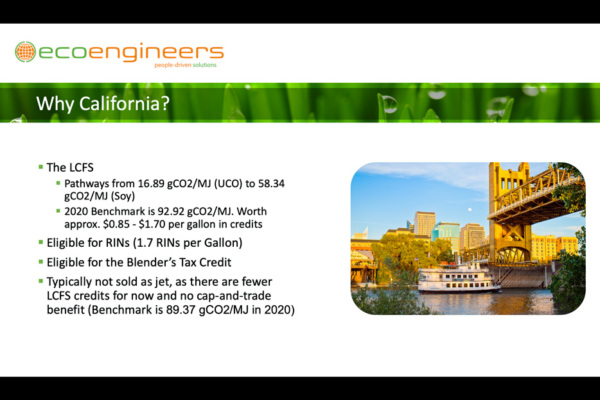Renewable diesel fuel is creating new opportunities in the fuel business and provides environmental benefits while also helping truckstop and travel plaza operators improve the economics of the fuel they sell.
“You have the potential to price your fuels more competitively and increase your profit margins,” said Ginger Laidlaw, vice president for the Alternative Fuels Council.
Laidlaw, along with Jeff Hove, fuels specialist for the Alternative Fuels Council and Roxby Hartley, senior regulatory consultant for EcoEngineers, spoke during a recent NATSO-sponsored webinar on renewable diesel. (Watch the full webinar presentation, Renewable Diesel: From Production to Pump, here.)
Both the Alternative Fuels Council and EcoEngineers are NATSO Chairman Circle Members. The Alternative Fuels Council provides renewable fuel insight and compliance solutions for downstream blenders and marketers, including an online RIN management software system. EcoEngineers offers a unique, comprehensive set of products and services designed exclusively for producers of low-carbon fuels or organizations focused on zero-carbon goals and sustainability initiatives for renewable energy, clean water and clean air. EcoEngineers provides audit, compliance management and consulting services, and delivers clean energy production across multiple industry sectors with its systematic, proven 360° approach.
Renewable diesel is a biomass-derived transportation fuel suitable for use in diesel engines. It meets the ASTM D975 specification for petroleum diesel in the United States. Additionally, renewable diesel is eligible for up to 1.7 RINS per gallon as part of the Renewable Fuels Standard, and for the IRS blenders tax credit, Hartley said.
Laidlaw said renewable diesel has several advantages. It improves local air quality. Plus, its fuel properties are similar to diesel, and it is considered a drop-in fuel that is compatible with current infrastructure and engines. There is also flexibility in how much of a percentage operators blend. “That is where it is really different from biodiesel,” she said.
Hove added that renewable diesel, in comparison to biodiesel, has an improved cetane number, up to 65. It’s cold flow improver is impressive, it has decreased microbial growth, decreased phase separation of water, and reduced NOx and CO2, he said.
“Over the last 10 years, the downstream and upstream industry have spent a tremendous amount of time talking about fuel quality and making sure new fuels prevent customer complaints,” Hove said.
However, there is currently no test method for renewable diesel fuel within ASTM standards. “One of the issues we want to drill down into is how do we test renewable diesel,” Hove said, adding that if it doesn’t go through the full isomerization process, then the fuel quality could be impaired, but it is very rare.
Renewable diesel production capacity is expected to more than quadruple in the next four years. One overseas company, Neste, and several American companies, including Diamond Green, REG, Altair and Sinclair, produce renewable diesel. Almost all U.S. capacity is sold in California due to the state’s low-carbon fuel standard, Hartley said.
“The California market will dominate until more states have low-carbon fuel standards,” Hartley said. “The Midwest and New York look like early candidates for LCFS programs.”
There could also be a federal low-carbon fuel standard if the administration changes, Hove said.
To learn more about renewable diesel, view the full webinar presentation, Renewable Diesel: From Production to Pump, here.
For any questions, please contact Ginger Laidlaw with the Alternative Fuels Council at glaidlaw@natsoaltfuels.com or Kathy Macbeth with EcoEngineers kmacbeth@ecoengineers.us.
Subscribe to Updates
NATSO provides a breadth of information created to strengthen travel plazas’ ability to meet the needs of the travelling public in an age of disruption. This includes knowledge filled blog posts, articles and publications. If you would like to receive a digest of blog post and articles directly in your inbox, please provide your name, email and the frequency of the updates you want to receive the email digest.

